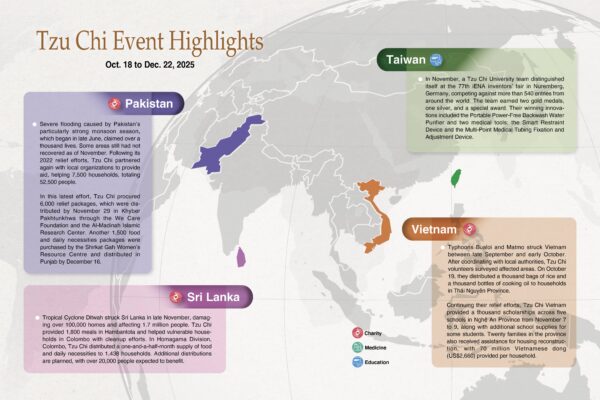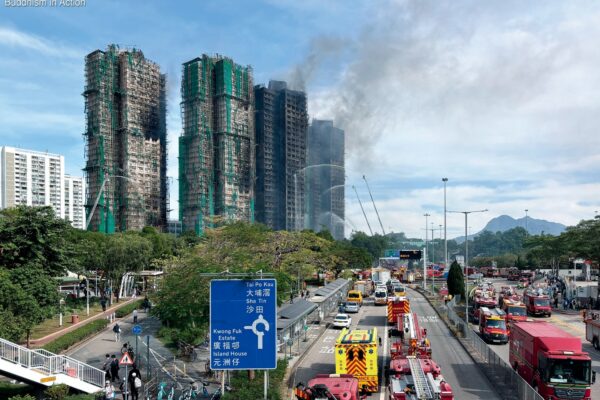By Zhang Yu-fan
Translated by Tang Yau-yang
Photos by Chen Zhong-hua
Medical professionals and support volunteers work together to make COVID vaccination a pleasant experience at inoculation sites at Tzu Chi Jing Si Halls. Every person present, the workers and the public alike, is doing their part in holding the pandemic at bay.
A nurse, decked out in personal protective equipment (PPE), stood next to a car in the sun one June afternoon in the parking lot of the Tzu Chi Sanchong Jing Si Hall in New Taipei City, northern Taiwan. She soaked a cotton ball in alcohol, bent down, and began carefully disinfecting a spot on the upper arm of an elderly woman, Ms. Lin, who was sitting in the back seat. The nurse was prepping her for her COVID vaccine injection.
After gently disinfecting the spot for 30 seconds, the nurse looked up at Lin and said softly, “I’m giving you the shot now. Take a deep breath.” The nurse carefully explained each step of the vaccination process to her to reduce her anxiety. Lin was 91 years old, so the medical team was being extra careful. Standing beside the car were three other workers, also in full PPE, explaining to Lin’s family things to look out for after the shot.
A nationwide COVID-19 vaccination campaign was launched in Taiwan on June 15, 2021. In response to the request of local governments, Tzu Chi volunteers have served as guides at government-designated vaccination stations. The foundation also offered 20 facilities in 11 counties and cities across Taiwan to be used as vaccination centers. Taipei Tzu Chi Hospital mobilized their doctors and nurses to help staff the vaccination stations at Jing Si Halls in Xindian, Shuanghe, Sanchong, Banqiao, and Luzhou, all in New Taipei City. Working with Tzu Chi volunteers and other on-site helpers, healthcare workers from the hospital provide professional services and tender care in comfortable settings to boost Taiwan’s vaccination rate.
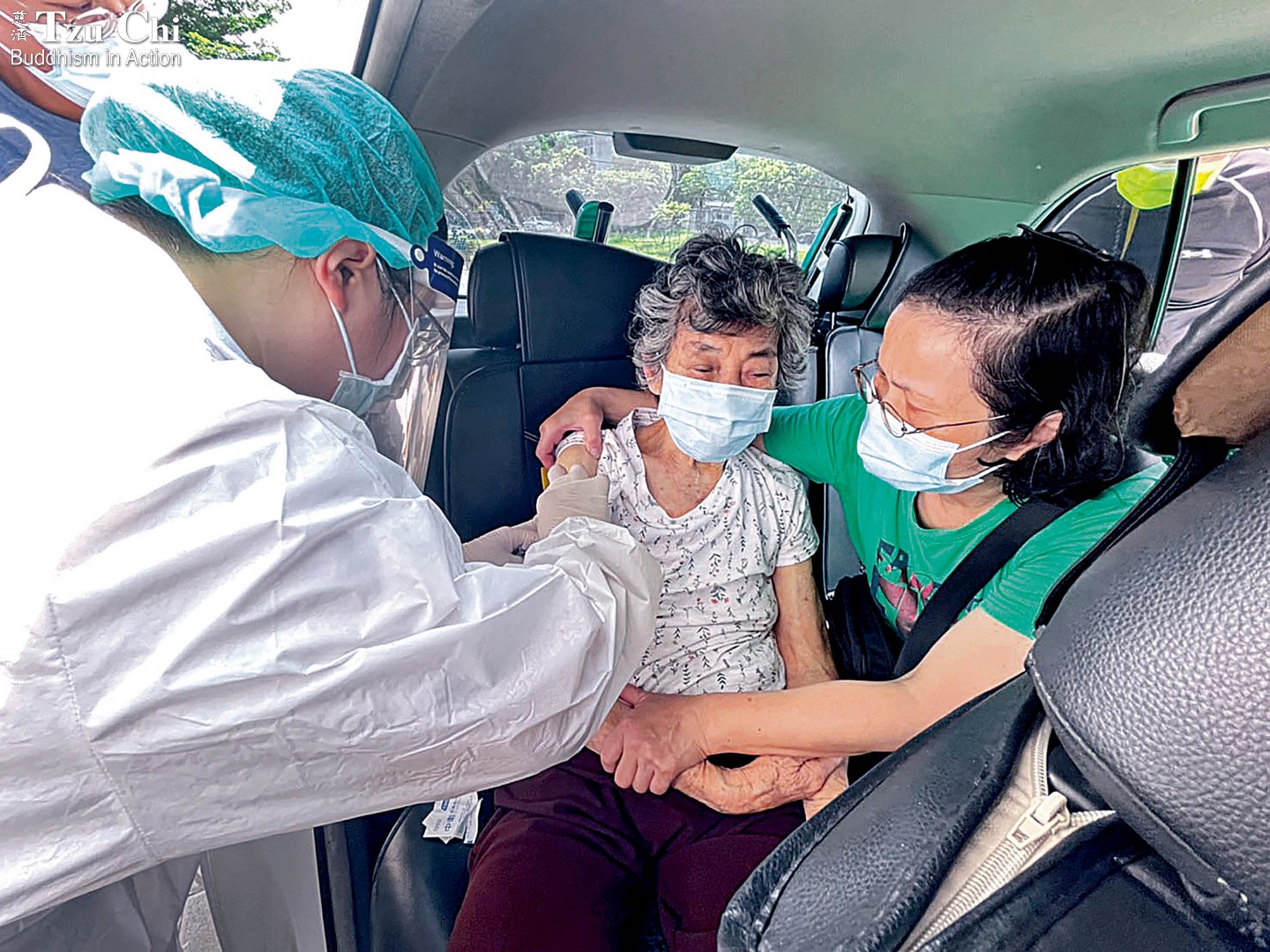
Ms. Lin, 91 and bedridden for many years, came in a car to the Sanchong Jing Si Hall in New Taipei City to receive her COVID shot. Considering her restricted mobility, medical workers went to the car she came in—parked in the parking lot—to vaccinate her. Courtesy of Luo Mei-zhu
Caring volunteers reassure the elderly
People over the age of 85 were the first group to be inoculated. In the lobby of the Sanchong Jing Si Hall, Tzu Chi volunteers wearing full protective clothing kept a close eye on things. When they saw vaccine recipients in the observation area preparing to leave, they stepped forward to express their care and offer a last-minute reminder: “Ma’am/Sir, be careful on the way home. Remember to drink plenty of water and get lots of rest.” After a vaccine recipient had left, a waiting volunteer used a blue-ray disinfectant spray gun and a rag to carefully sanitize the vacated chair for the next user.
There were Tzu Chi volunteers and other workers on-site to guide people through the entire process from beginning to end. They helped recipients check in, fill out personal information forms, consult with a doctor, receive the shot, and so on. Veteran volunteer Luo Mei-zhu (羅美珠), coordinator of the on-site services, pointed out that many changes had been made thoughtfully at the Jing Si Hall to make it easier for the elderly to use the facilities. For example, all Jing Si Halls have wooden flooring, and in normal times people are expected to take off their shoes when they enter, according to Asian tradition. But during the inoculation sessions, vaccine recipients were allowed to walk into the Jing Si Hall with their shoes on. To protect the floor, volunteers had put thin wooden sheets or floor mats on top of the flooring. Anti-slip devices were also installed in case of rainy days.
Chao You-chen (趙有誠), superintendent of Taipei Tzu Chi Hospital, described another strategy to make the vaccination experience more positive for the elderly. He said vaccination venues that served larger crowds, such as the Jing Si Halls in Sanchong and Xindian, were equipped with medical-care carts and rolling chairs for medical workers so that they could easily move from one person to another. This minimized the frequency that the elderly had to move around on-site; they could remain seated while workers came to them for pre-vaccination consultation or inoculation. This vaccine administration method, dubbed the “Umi-machi style,” was invented in the town of Umi in Fukuoka Prefecture, Japan, and made getting vaccinated much easier for people who had trouble moving around easily.
Another thoughtful setup was a separate zone for people who came in wheelchairs—once they were pushed to the zone, they received their shots in place and stayed there for rest and observation.
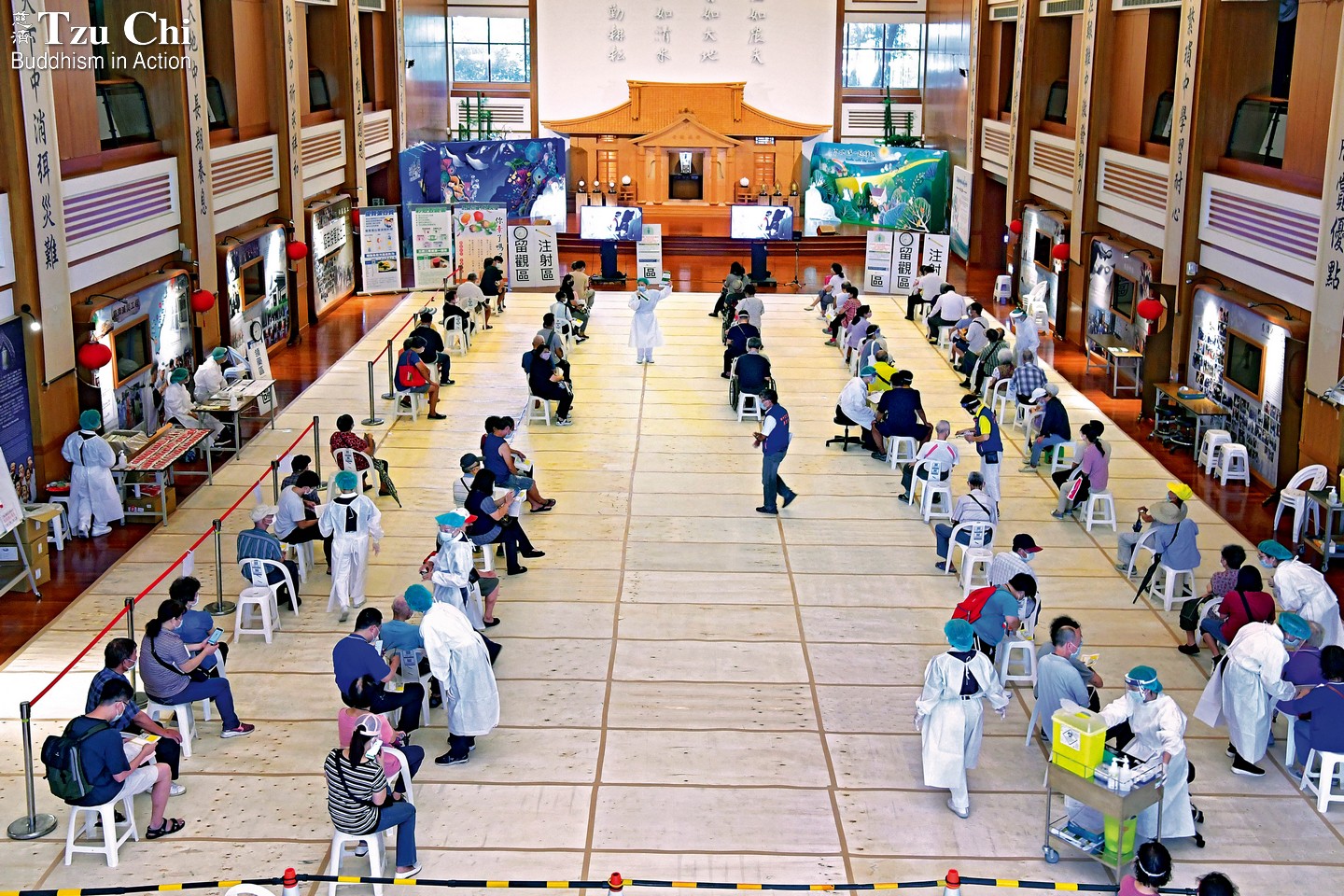
A scene at the inoculation site at the Sanchong Jing Si Hall. Medical workers and support volunteers work together to make COVID vaccination a pleasant experience for vaccine recipients.
Zhang Kai-yan (張凱雁), a nursing administrator from Taipei Tzu Chi Hospital, explained that people would see clear instructions on where to check in as soon as they arrived at the Sanchong Jing Si Hall. After their identity had been confirmed, they completed a Vaccination Evaluation and Intention Form, then underwent a consultation with a doctor. The doctor evaluated whether they were suitable for vaccination by asking about their medical history, whether they had allergies, and the medications they were taking. The physician would also explain possible side effects before the injection. After the shot was administered, the nursing staff noted the observation time on a form, and pharmacists would dispense fever medicine just in case it was needed.
Many people had already gathered in front of the main entrance of the Sanchong Jing Si Hall by 6:30 a.m. on the first day of the vaccination drive. Zhang observed that many older folks were accompanied by their children. She said, “Many people treated the vaccination of their elderly loved ones with great caution.” They worried about their seniors being vaccinated, but were more concerned about the risks of not being vaccinated. Zhang said that someone even wrote the following on a Vaccination Evaluation and Intention Form: “Our whole family has discussed and decided to let our mother be vaccinated.”
Medical staffers did everything possible to make the inoculation process easier for those who came for the shots, especially people with special needs. Mr. Lin, who brought his bedridden mother, was relieved. He had been worried that he would not be able to get his mother out of his car for the shot all by himself, but when he told a worker in the check-in area about his situation, a special service was provided to his mother. Medical workers went directly to his car to give his mother the shot. Volunteers also went to his car to check on his mother during the observation period after the shot. All this thoughtfulness really warmed his heart.
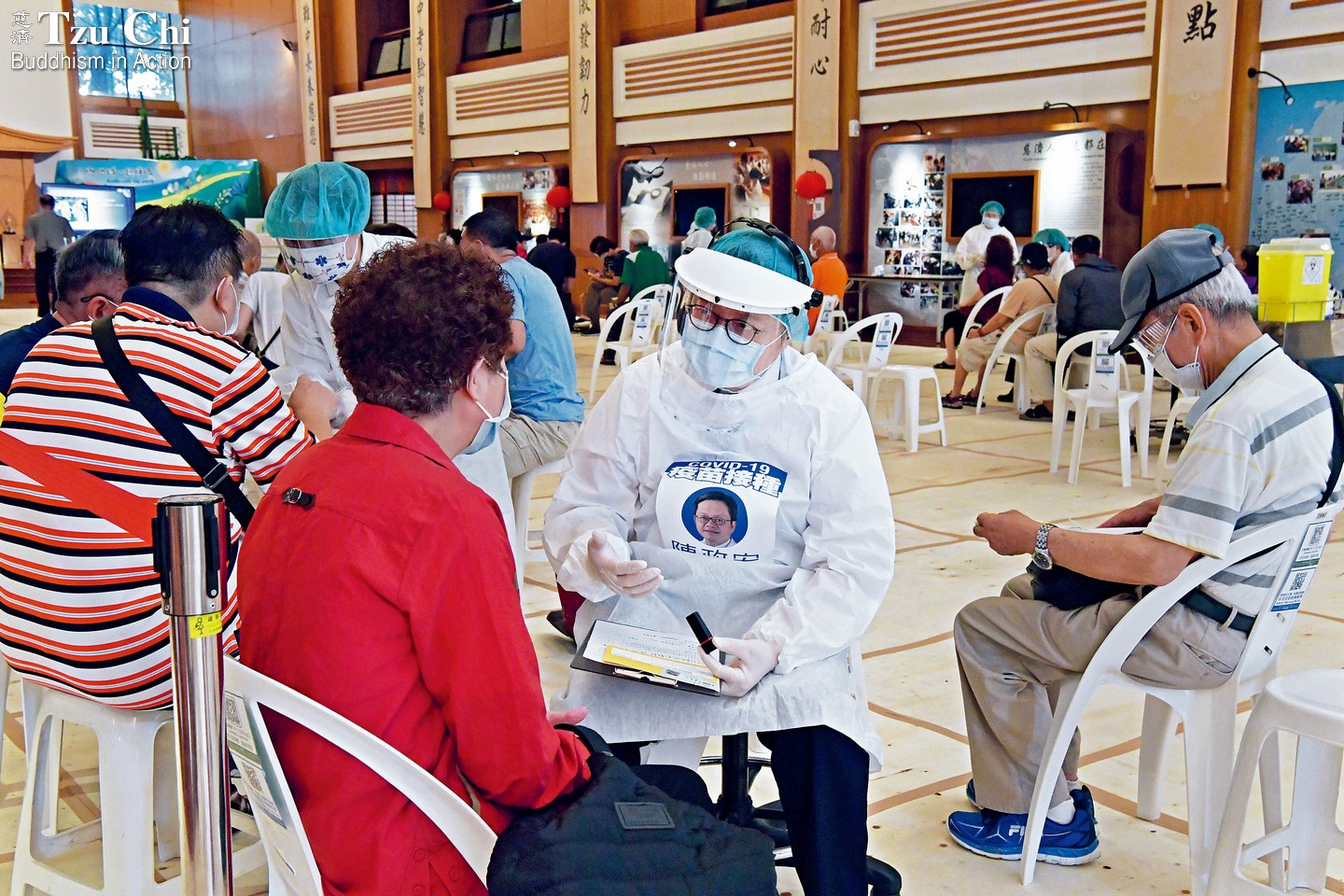
Medical workers wear their photos and names on their chests to identify themselves. This is out of respect for and to make vaccine recipients feel more secure while being vaccinated.
Medical outreach
When the pandemic flared up in Taiwan in May 2021, Taipei Tzu Chi Hospital took in infected patients, assumed responsibility for a quarantine hotel for COVID patients with mild symptoms or no symptoms, and set up a community COVID screening station near the entrance of the hospital. Zhang Kai-yan explained that the hospital even reduced its non-emergency medical services so it could take in more COVID patients.
The hospital also enlisted employees to take part in the vaccination program, though such participation was voluntary. Responses from staffers at the dialysis center and the health examination center were especially enthusiastic. Very soon all the available slots were taken. For the vaccination drive for the over-85 age group, the hospital mobilized about 250 physicians, nurses, pharmacists, and administrative staffers every day to support the inoculation efforts.
The help of Tzu Chi volunteers was also needed at vaccination sites offered by the foundation. Priority was given to those with experience volunteering in Tzu Chi hospitals and who were therefore more knowledgeable in how to protect against infections. Participation was voluntary and the family of each prospective volunteer had to first give consent. Luo Mei-zhu said that she was told that about ten volunteers would be needed each day at the vaccination station at the Sanchong Jing Si Hall. She phoned some medical volunteers who had been vaccinated and who lived close to the Jing Si Hall to ask about their willingness to participate. After just a few phone calls she had enlisted enough people to help.
On the first day of the vaccination program, all workers wore full PPE, medical professionals and support volunteers alike. It was difficult for people to tell them apart. On the second day, Taipei Tzu Chi Hospital decided to put photos and names on medical workers’ protective clothing so that it would be easier for vaccine recipients to learn who was serving them.
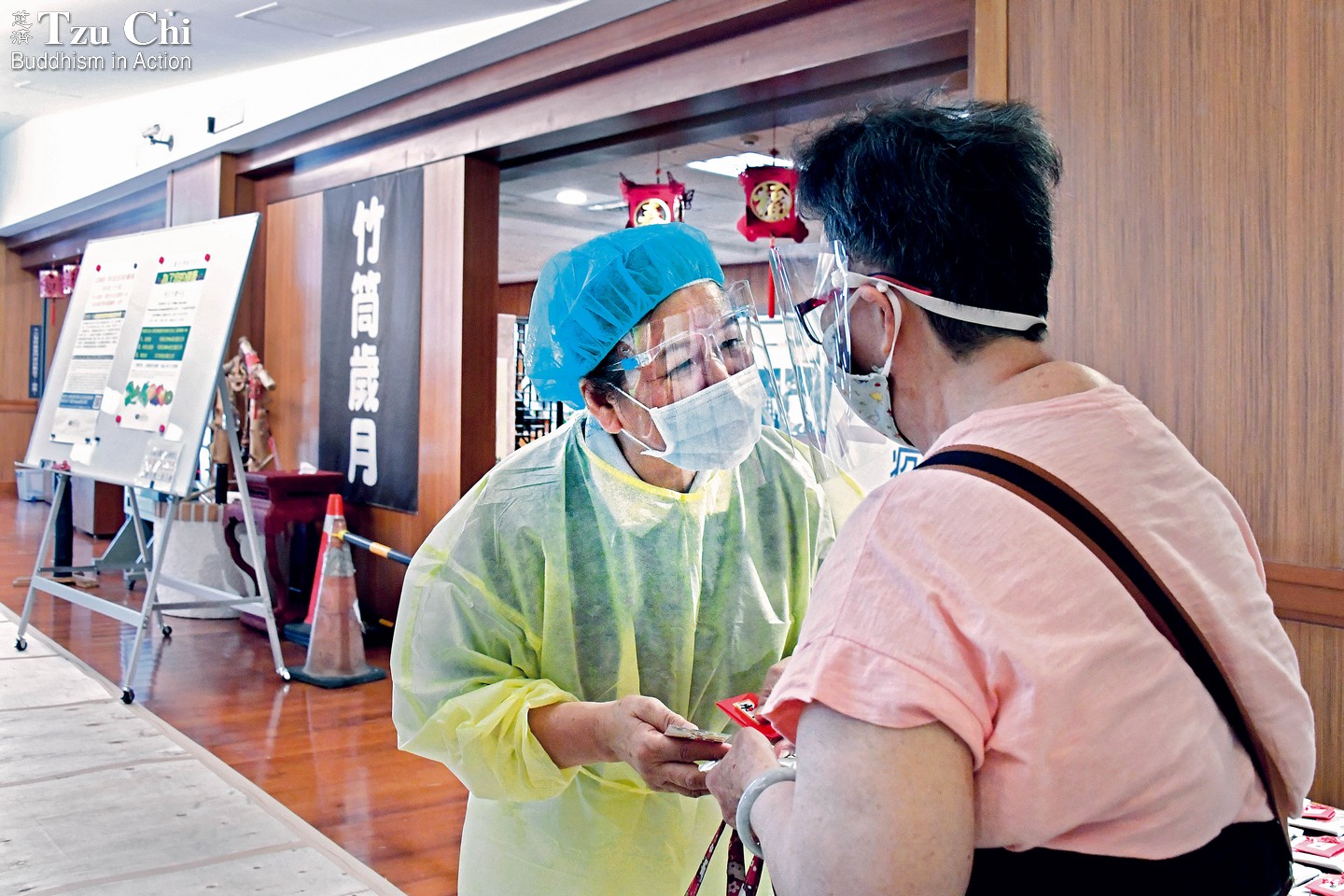
Volunteer Luo Mei-zhu (left) warmly greets a woman who has arrived at the Sanchong Jing Si Hall for her COVID shot.
Superintendent Chao You-chen stated that it was out of respect for vaccine recipients that they made that decision. Being able to put a name and face to the medical professional serving them would enhance the seniors’ sense of security and trust. Doctors also briefly introduced themselves before providing consultations. Ms. Chen, who accompanied her mother to the Sanchong Jing Si Hall to receive her shot, praised such thoughtful arrangements. She said that such considerations helped her mother and her feel more at ease.
The temperature during summer in Taiwan can easily soar to 36 degrees Celsius (97 degrees Fahrenheit). Volunteers placed large electric fans and ice cubes in the outdoor canopied area to bring down the temperature so people waiting there would be more comfortable. Volunteers also handed out bottled water. In the check-in area, Luo Mei-zhu saw many people showing up with parasols and folding canvas chairs, but in the end such items weren’t needed. Volunteers had set up the venue in a way so as to accommodate the needs of not just vaccine recipients but also their families. A local official who was helping on-site said that he felt very fortunate to have been assigned to serve at a Jing Si Hall. Not only did Tzu Chi volunteers help him with his work, but the smiles on the faces of the medical workers made him feel happy and warm.
People were touched by the good services offered at a Tzu Chi vaccination site, as evidenced by this example: after accompanying an older family member to a Jing Si Hall to receive her shot, a young man returned later amidst heavy rains to the venue to donate money to Tzu Chi. It was his way of thanking the on-site workers. His kind gesture, extending the gratitude he felt by paying forward the care his family member had received, warmed everyone.

